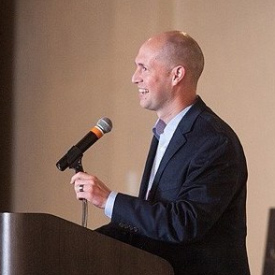Captured by Writers
Eugene Peterson, long-time evangelical pastor, author, and professor, recently released his memoir The Pastor. Early in the work, he describes his childhood in Montana, with stories of bullies, eccentric relatives, and working in his father’s butcher shop. Among his formative memories, Peterson includes his fondness for The Carnegie, the town library.
The Carnegie was the public library in our town, a square redbrick building, roofed by a rotunda. In the entrance area there was a mountain goat, “the beast the color of winter,” on display in a glass case, mounted climbing a rock face. I loved that goat, a wild and dramatic welcome ushering me into the world of books. Entering the library, I never passed that goat without stopping and admiring it for a couple minutes.
From an early age I loved learning but never cared much for school. The Carnegie was my school of choice. Schools were okay – I made friends and played games. But the Carnegie was where I found myself in a place of uninterrupted learning. I could lose myself there and indulge my curiosity in that magnificent world of books. I started early, soon after I could read. By the time I was in the seventh grade, I was riding my bike after school to the Carnegie and spending my Saturday mornings there discovering novels and poems, captured by writers who led me into the way of words, the world of imagination.
Later, Peterson adds:
The Carnegie supplied me with a faculty of great teachers. As I marched along the prescribed school itinerary from grade to grade, I acquired the rudiments of getting on in the world but my education took place in the Carnegie. That is where I learned to love learning for its own sake. The Carnegie is where I sat under the tutelage of Emily Dickinson. The Carnegie is where Melville and Hawthorne gave me a ballast of an imagination adequate to keep me steady in a culture that is naive regarding sin and evil.

Brian Phillips
Dr. Brian Phillips serves as a pastor in Concord, NC, where he lives with his wife and their four children.







